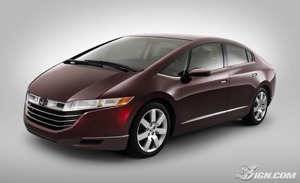High oil prices and the realization that fossil fuel use is causing climate change has resulted in more attention than ever to alternative fuels for transportation. This past weekend, a two-week national tour of hydrogen-powered vehicles wrapped up in Los Angeles, after making its way across the US.
When it comes to alternative fuels for vehicles, biofuels such as E85 ethanol and biodiesel are the ones getting most of the headlines. The reason for this is simple; the fuels are available now, and the vehicles we can buy or drive can use them without much hassle (without any hassle in the case of biodiesel). But simply replacing one form of hydrocarbon for another is viewed by some as a stop-gap measure, and that the next leap forward will be made with the successful adoption of a completely alternative method for providing propulsion.
Electric cars and their plug-in hybrid relatives are probably the closest to reality. Low-volume manufacturers are starting to bring electric cars to the market, but it's very early days even for the furthest ahead, such as Tesla. The plug-in hybrids, cars which use electric power for the majority of the time but still have a back-up internal combustion engine—are slightly further away, although GM is investing heavily in this sector and plans to have the Chevrolet Volt in mass production within the next five years.
 Looking even further out, the next technology that has captured the attention of the automotive world is hydrogen. That simplest of elements, with its single proton and electron, can be used in place of the more traditional hydrocarbons in a combustion engine, or to generate electricity in the more exotic H2 fuel cells.
Looking even further out, the next technology that has captured the attention of the automotive world is hydrogen. That simplest of elements, with its single proton and electron, can be used in place of the more traditional hydrocarbons in a combustion engine, or to generate electricity in the more exotic H2 fuel cells.
It's not so much that the technology to use H2-powered cars doesn't exist right now, as companies like BMW and Mazda have shown that their engines can be modified to use H2, and Honda has developed a fuel cell-powered FCX, but all of these are either technology demonstrators or at best runs of around 100 vehicles, heavily subsidized by the manufacturers as a PR move.
No, the problems are structural; unlike gasoline or diesel or even electricity, there is almost no national infrastructure to support a fleet of hydrogen-powered cars, a fact underlined by the Hydrogen Road Tour 08, which had to resort to carrying the vehicles on flatbeds for large stretches. Fuel cells are even further off, with no way as yet of manufacturing them at prices that consumers would be able to pay.
There are also concerns over the carbon-neutrality of H2 compared to biofuels. Although you only really need water and electricity to generate H2, without a greater expansion of nuclear or alternative energy, that electricity would come from burning fossil fuels, which simply moves the point of pollution from individual road users to the power plants.
On the other hand, a solution to the carbon-neutrality issue could be the intriguing idea of having refueling stations that generate their own hydrogen on-site with wind turbines or solar panels providing the juice for hydrolysis, or even using algae reactors. One thing seems fairly sure, though: without places to refuel, don't count on seeing H2-powered cars on the streets any time soon.
reader comments